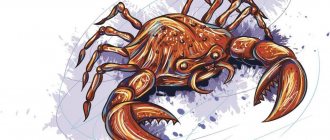In this article we will tell you:
- How does bad character manifest itself in different situations?
- List of negative qualities of a person with transcript
- Negative characteristics of people
- Combating manifestations of negative character traits
We are not perfect, all people have strengths and weaknesses. The psychology of personality and its constitutional characteristics of the body determine the presence of positive and negative qualities of a person. The constancy of character manifestation determines the state of the nervous system. At the same time, its dynamics are determined by external factors. The society in which a person lives dictates conditions in the form of generally accepted norms and rules of behavior. From birth, everyone is assigned good and bad qualities as a person. But how they will be manifested in later life depends largely on upbringing and the ability to control oneself in any situation.
Upbringing and the type of family relationships mean a lot for the formation of a child’s character traits. Often, the predominance of negative traits becomes a serious obstacle to a prosperous life, friendship, finding a good job, and also in love.
As already said, there is a division into positive and negative qualities of a person. The question arises, can only negative traits be present? Psychologists say that this is almost impossible. Even the most notorious scoundrel has positive traits.
List of negative character traits
The list can be quite impressive. In addition, many qualities are similar to each other or follow from one another. Therefore, here I will list the main character traits that are generally considered negative in society:
- Authoritarianism is the desire to rule, suppress and dominate, regardless of the desires and interests of others.
- Aggression is a hostile attitude, conflict, which can be either a predisposition to harm or an affective state.
- Gambling is a personality trait that is expressed in the rapid loss of control over one’s behavior when achieving a goal. Often associated with play, risk, and danger.
- Greed is an excessive desire for wealth. This quality is also called stinginess, greed.
- Irresponsibility is inherent in people who cannot or do not want to be responsible for the consequences of their actions, words, and follow established rules and norms.
- Indifference is an apathetic, indifferent attitude towards people around you, towards work or towards life in general.
- Ruthlessness is cruelty for the sake of cruelty itself, the purpose of which is self-affirmation and obtaining satisfaction from the knowledge that pain and suffering are caused to someone.
- Arrogance is a disregard for the rules of decency, standards of ethics and morality, laws, and personal boundaries of others. Synonyms for this concept are tactlessness and swagger.
- Vulgarity is often used as a negative characteristic of a person’s taste, the opposite of the concept of beauty. Can refer not only to appearance, but also to behavior, describing it as rude, public, vulgar, obscene.
- Pride is excessive arrogance, arrogance, conceit, which is expressed in an excessive thirst for praise and impatience of any criticism and reproaches.
- Rudeness is a concept close to rudeness. This is a statement or behavior that does not correspond to the norms of human communication. The desire to humiliate the interlocutor and receiving satisfaction from this.
- Greed is expressed in an immoderate desire to consume and own.
- Cruelty is a manifestation of rough treatment of people or animals, which is often accompanied by infliction of physical or mental pain.
- Envy is a whole spectrum of feelings and behaviors that arise in relation to those who own something bigger and better.
- Complexity is a manifestation of excessive constraint, shyness, and depression about one’s imperfections, including imaginary ones.
- Boring is a character trait that can be described as boring others with one’s own position in life, imposing one’s thoughts on them. Such individuals are considered boring, annoying, fixated on some problem.
- Anger is a strong emotion directed at a particular object in the form of anger, frustration, irritation. It arises as a reaction to a situation that prevented the satisfaction of a person’s needs.
- Spoiledness is a selfish tendency to realize one’s own desires and intentions to the detriment of others’ desires and intentions.
- Falsehood is a tendency to create a false image among others about oneself, the events involved, and facts for the sake of personal gain.
- Laziness is a tendency to laziness, an indifferent and lack of initiative attitude towards work, a preference for idleness over work.
- Hypocrisy – involves insincerity, pretense, deliberate concealment of one’s real emotions, feelings, thoughts. Such people are called two-faced, having double standards.
- Pettiness is the tendency to attach great importance to the unimportant at the expense of the truly important. Expressed in increased attention to trifles, pickiness, envy, greed.
- Commercialism is the desire to extract material benefit from everything, greed for money, prudence, selfishness.
- Suspiciousness – increased anxiety, distrust, a tendency to see troubles, dangers, and a catch in everything.
- Vindictiveness is the name given to the tendency to respond with evil to evil. Such people remember even the smallest quarrels, any rudeness said to them, every act that caused offense, and are able to hatch a plan for a long time to restore “justice.”
- Impudence is a quality akin to impudence and impudence, manifested in attempts to embarrass the interlocutor, demonstrate one’s superiority and a sense of impunity.
- Arrogance is a quality that allows a person to create a false sense of his own importance and significance. Manifests itself in a demonstration of coldness, indifference, and detachment.
- Narcissism is a character trait that is expressed in excessive narcissism and inflated self-esteem.
- Touchiness is the tendency to see insult and humiliation of one’s own person in everything and at the same time feel self-pity and anger at the offender.
- Irritability is a temporary reaction or a permanent character trait, which is based on excessive responsiveness to even weak provoking factors and an unwillingness to restrain one’s violent emotions about this.
- Cowardice is the inability to overcome fear in situations in which a person must express himself in a certain way.
- Vanity is a concept similar to star fever, when an obsessive need to confirm one’s superiority arises. Such a person craves fame, honor, respect, praise.
- Stubbornness is excessive persistence, excess tenacity.
- Selfishness is a person’s desire for his own benefit, which is expressed in all his words, actions, in all areas of life.
You may be interested in knowing what a person's personality is.
More than 100 cool lessons, tests and exercises for brain development
Start developing
Classification of personality characteristics
An individual is known and studied by his innate properties. This concept refers to stable phenomena that characterize it not only psychologically, but also emotionally.
This list includes:
- Temperament is individual characteristics associated with types of nervous functioning. It is this that is the “foundation” of people’s development.
- Character is an acquired, permanent quality that determines a person’s behavior with others and with reality.
- Abilities are abilities and skills that are the main point for achieving success in a certain activity.
- Orientation is a set of motivations, motives and aspirations to get what you want.
All characteristics are divided into positive and negative. You need to know them in order to correctly analyze your essence, as well as those around you, and begin to work on your shortcomings. However, it should be remembered that such a division is conditional and is determined by the established foundations in society, a personal sense of morality and ethics.
Weaknesses for a resume
Employers often ask candidates to list their weaknesses. This is done in order to assess how self-critical the applicant is and whether he is able to accept constructive criticism. Therefore, you should not leave this field in your resume empty or put a dash through. At the same time, you need to be careful in choosing negative qualities.
Here are the worst ideas for a resume, things you definitely shouldn’t write about yourself:
- hot temper,
- bad habits,
- unpunctuality,
- intractability,
- pessimism,
- passivity,
- meanness,
- extravagance,
- timidity,
- secrecy,
- negligence,
- cunning,
- cynicism,
- causticity.
What negative qualities might be appropriate:
- excessive demands,
- straightness,
- tendency to reflect
- gullibility,
- workaholism,
- self-criticism,
- reliability,
- risk appetite.
An assessment of the profession itself that you are going to get a job will also help you choose suitable character flaws. Review the job requirements and identify character traits that will not interfere with your responsibilities or will even help in future work.
For example, a sales specialist can indicate the following as weaknesses:
- excessive desire to communicate;
- maximalism;
- ambition;
- self-confidence;
- curiosity;
- restlessness.
You can write the following negative traits to an accountant:
- shyness,
- pedantry,
- slowness.
As neutral minuses you can also indicate:
- fear of flying on airplanes;
- age (for people over 40 years old);
- lack of work experience;
- shopaholism.
To better understand yourself and competently present your strengths and weaknesses, I suggest that you read the article about what temperament is and its types.
Arrogance - false confidence in superiority
It is very difficult to communicate and work with such people. An arrogant person always puts himself above others, treats them with disdain and arrogance, and ultimately suffers himself. Friends and relatives often turn away from arrogant people. It is unbearable to be in the company of someone who constantly belittles, does not want to see their merits and skills in others, puts himself on the first step, without even having a small part of the merits of his interlocutor.
Arrogance is false grandeur
Such behavior hides complexes that were laid down a long time ago. The personality hides its insecurity and inability under non-existent greatness. All this in order to appear better to others. Arrogance contradicts the normal awareness of one’s abilities, perception of others, and interaction with them. This trait is one of the most negative; it only brings disappointment to others when communicating with such an interlocutor.
When disadvantages can be advantages
Continuing the idea that in certain circumstances certain negative qualities can be beneficial, here are some examples of human shortcomings and their useful applications:
- Self-confidence. This trait would look great on a potential manager’s resume. A confident person will be able to become a leader and lead people.
- Straightforwardness. On the one hand, this is a tendency to cut the truth everywhere and always, without taking into account the feelings of other people. But on the other hand, you can hardly expect trickery or gossip behind your back from such a person.
- Shyness. Such an employee will not be familiar with his superiors, conflict with colleagues and be rude to clients.
- Hyperactivity. It will help where you need to keep up with a lot, work in constant multitasking mode, and show initiative.
- Slowness. This disadvantage will appeal to those who are looking for attentive, diligent employees for monotonous work that requires perseverance.
- Recency. Such a person will not waste working time on empty chatter and will be able to work more.
- Mistrust. It will be useful in professions that involve negotiating with counterparties, concluding important transactions, and checking the reliability of clients.
- Anxiety. This quality will force the employee to double-check his work for errors and take care of its quality and cleanliness of execution.
- Modesty. A well-known saying says that it adorns a person. Be that as it may, such quality will not become an obstacle where the employee is not required to be active and communicative.
- Stubbornness. This trait can help you achieve your goals, move forward and not give up at the slightest obstacle.
- Pedantry. Such a person may seem boring and boring, but he will always keep his desk clean and take his responsibilities responsibly.
Cruelty - open hatred
People with this character trait, unfortunately, can take any action, even the worst. Often cruelty begins to manifest itself in childhood, where the child takes it out on animals, and as an adult redirects his quality to people. From a very early age, parents can prevent this by explaining to their child that hurting others is unacceptable. If a cruel person has a family, he will certainly show his worst qualities in it; children will take a bad example from their parent, becoming cruel.
A cruel person not only causes physical pain, violence, humiliates, insults others morally, and can set them up. As a result, he takes pleasure in the suffering of the victim. It is extremely important to understand that these actions are destructive and in reality do not bring anything good. It is much more important to improve yourself, to stop being angry and offended. Cruelty reflects:
- own dissatisfaction;
- dissatisfaction with oneself;
- inability to cope with emotions, grievances;
Cruelty is a negative attitude towards the surrounding world.
A cruel person blames those around him for all his troubles, bringing them suffering. Others perceive him as strong, powerful, domineering, they are afraid, they avoid him. It is immediately clear that it is difficult for a cruel person to communicate with loved ones; he has few or no friends. The most terrible consequence of cruelty is revenge for the grievances received. It can manifest itself in a variety of methods, ranging from prolonged, gradual bullying to physical violence. Such a person, who is possessed by cruelty, often simply loses his mind. You can get rid of this, sometimes the process takes a lot of time, involves working on yourself, working with specialists whose goal is to convey the negative of this quality.
Selfishness is love only for oneself
An egoist is driven only by personal gain; he always thinks only about himself, his well-being. You cannot expect responsiveness, mutual assistance, or participation in business for the benefit of others from such people. An egoist will not do what is unprofitable for him. It is worth remembering one thing: an egoist is doomed to loneliness; there will never be anyone around him who wants to help, because he himself is not capable of this. It is very difficult to live and work with such people, they do not know how to sacrifice, they think only about themselves, they strive for a comfortable life, they extol their own desires above those of others. Outside opinions and criticism are unimportant for them. Decisions are made only based on one’s own desires and goals.
Selfishness - only for your loved one
The egoist loves himself very much, even forbids others to love themselves, because, in his opinion, they are simply unworthy of it. Self-confident people who have high self-esteem become egoists. The problem lies in the formation of personality, which often develops from childhood. At a certain point in life, due to unfavorable conditions, selfishness begins to form. This can happen at any age.
Envy
Envy - A feeling of annoyance caused by the well-being or success of another.
A normal personality trait.
Gratitude
- Feeling of gratitude to someone. for kindness and attention
Jealousy is a negative feeling in interpersonal relationships that occurs when there is a lack of attention, love, respect or sympathy from a loved one or a highly respected person while someone else allegedly or actually receives them from him. One of the most difficult and unpleasant experiences.
Normal personality trait
Faith
— Conviction, confidence in someone
Love
is a feeling characteristic of a person, deep affection for another person or object, a feeling of deep sympathy
Suspiciousness - Tendency to arise, express suspicions. Tendency to mistrust.
Normal personality trait
Confidence
- open, positive relationships between people (person and subject), containing confidence in the decency and goodwill of another person (subject), with whom the trustor is in one relationship or another.
Deceit is the success of the false ego
A clear manifestation of one’s own insecurity, a desire to impress others, even if this means using a lie. A deceitful person comes up with false information, presenting it as reality. The consequences are very sad: distrust of others, loneliness, loss of work, because few forgive lies. If a person constantly lies, over time he himself will become entangled in lies and will certainly be exposed.
Deceit - self-betrayal
Often, a liar simply does not want to, does not know how to perceive reality, and deliberately creates a distorted image of himself, events and facts among others in order to achieve a selfish goal and prevent the negative consequences of his deed.
Important Tips
Before you start listing personal qualities, it is worth studying examples and examples of successful and well-written resumes that can be found on the Internet. We can safely say that the following rules apply here:
- Information should only be truthful and reliable, since deception cannot be hidden for long, and therefore it is best to simply be honest.
- When expressing personal qualities, there is no need to be clever - short and understandable phrases will characterize the applicant much better than written stories.
- Be sure to be literate and formulate phrases stylistically correctly.
- It is important to highlight 4-5 qualities that really matter to an employer.
If you put maximum effort into writing your resume and think through the right answers to even the most inconvenient questions, the employer will receive a document that will really be interesting and memorable, which means the chance of getting your dream job will be increased significantly.
Conflict
It’s good to be calm, non-conflict, and liked by everyone. For example, a person took your seat in a movie theater - is it difficult for you to change seats? The cashier didn’t give me enough change, but it was just pennies. A colleague went on vacation and delegated the deadline to you last week - but you won’t ruin the relationship. In general, everyone around feels good when you are calm and non-conflicting.
But when you are ready to openly enter into confrontation, you sit in the place you have chosen, do not do their work for others, and feel pretty good.
Greed - thirst for more
Greedy people always cause contempt. This trait prevents you from building relationships with others, from working, from living, from being happy. After all, a greedy person always wants more, is unable to stop, help others, or enjoy what he has. A stingy person is ready to minimize all expenses, even to his own detriment. Greed is also manifested in the reluctance to part with unnecessary things, excessive saving of money, hygiene products, household services, and other things.
Greed is the path to loneliness
The reason for this behavior is self-doubt, depression, low self-esteem, and self-rejection. The desire to receive more and more comes precisely from one’s own dissatisfaction. Thus, a person tries to elevate himself not by personal development, but by material accumulation. There is no cure for this, the worst trait, but it is imperative to fight it. After all, such a quality has an impact on the psyche, emotional health, and leads to constant tension and illness. Greedy people are actually very unhappy, because they are often lonely.
Never admits his mistakes
Abusive people almost never admit to their own mistakes. They will foam at the mouth to prove that they are right, blame anyone around them, but will not admit to their own mistakes. In general, their main strategy in disputes is attack, rather than constructive dialogue and listening to the other side. It is not so important for him to achieve the truth as to blame his opponent for everything by any means and make him the culprit of the entire situation.
READ ALSO: 7 sure signs that your friend is in love with you
Tends to talk about others and gossip
They tend to discuss everyone around them (naturally, in a negative light), spread gossip and pour bile and poison on everyone they meet.
By this sign, you can quite identify a cruel person, just listen carefully to how he speaks about those around him. It’s one thing when he doesn’t like the elected representatives from his circle, and another thing when everything happens, even without any particular reason, or for far-fetched and concocted reasons. He may not even really know the person, but he automatically doesn’t like him anymore and he will find a reason to say nasty things about him .
In addition, if an ordinary person expresses his opinion relatively indifferently or even with regret that he was disappointed in a person, then someone prone to harshness will speak with frenzy, using all sorts of gross insults and as if experiencing physical pleasure from what he is saying .
Intolerance
Intolerance - the inability or unwillingness to tolerate, acknowledge or put up with something
Normal personality trait
Tolerance
- behavior that involves not pursuing those whose way of thinking or acting does not coincide with your own and causes someone else's disapproval
Stubbornness is excessive and unreasonable persistence. In moderate form, it turns into the virtue of firmness and perseverance in achieving the goal.
Normal personality trait
Flexibility
— thinking that helps to cope with difficulties and find alternative ways of development. Thanks to flexibility, we can take on different points of view, looking at situations from different angles.
Condemnation - Disapproving opinion, censure
Normal personality trait
Adoption
- don’t grumble, don’t get angry and don’t swear
Prejudice - Preconceived negative opinion, attitude towards someone or something
Normal personality trait
Openness
- frankness, truthfulness, trustfulness. Open (person) – sincere, frank, expressing directness. Openness is a character trait of a noble and generous person who has no need to hide his deeds and thoughts.
Schadenfreude - Malicious joy at the misfortune or failure of another
Normal personality trait
Compassion
- Pity, sympathy caused by the misfortune of another person
Impudence - unceremonious behavior
There are many proverbs in the Russian language on the topic of arrogance, one of them says that arrogance is the second happiness. Perhaps, but only for the arrogant and only temporary. Those around such a person will always dislike and despise. Impudence is a related trait to impudence and impudence. The trait manifests itself in different ways, including raising the voice, looking directly at someone, and embarrassing the interlocutor in various ways.
Arrogance - contempt for others
Often, arrogance is the result of impunity, awareness of one’s safety, superiority over others due to despair, self-confidence, high status, position. Many people respond to impudent behavior with irritation, contempt, and are ready to speak out and fight against it. This is because the arrogant person often steps over those around him.
He has double standards
They usually very harshly and adamantly declare some of their life views, but in fact, they usually make these demands only on others, and not on themselves , and, moreover, they can change in accordance with his benefit and depending on situations.
For example, at the very beginning, he can tell his woman that he believes that the main thing in a relationship is fidelity and honesty, and he himself will recklessly cheat and lie, but ask his wife to fulfill the initially stated demands.
In addition, in any situation, he can twist his own words and statements in a way that is convenient for him, and naturally interpret the same act committed by him and another person differently , in his direction.
Wants to please everyone around him
Such people are so afraid to show their true colors that they are ready to do anything in order to be good in the eyes of others - lies, endless proof, etc. Very often they take pity , telling tearful stories from their past and justifying their unsightly actions with psychological trauma from them, or simply sharing their sob stories to evoke compassion and sympathy. Moreover, half of these stories can be made up or turned in a different direction, naturally, beneficial for him; they are excellent at distorting facts . For example, he can tell with tears in his eyes how a woman cheated on him and now because of this he is so jealous and distrustful, although in fact it was he who cheated on her, and he has always been a pathological jealous person.
The funny thing is that such people try to look white and fluffy in front of absolutely everyone , even if it is a complete stranger whom he will never see again. Sometimes you get the feeling that by making excuses to them, they are, as it were, making excuses to themselves.
Hypocrisy - immoral actions
Pretending to be kind, loving, and sincere is a manifestation of one of the worst qualities, called hypocrisy. A hypocrite is ready to go to great lengths to achieve his goals, flatter others, and commit immoral acts. Very often a hypocrite is an egoist. The main thing that forces one to hypocrisy is fear of one’s own opinion, perception of the real, low self-esteem. Such a hypocrite is not only with others, but also with himself.
Hypocrisy - masks of one face
This trait can be recognized by several signs. The person smiles insincerely, is tense, has a deceitful, glassy look. When communicating with a hypocrite, one should be very alarmed by the lack of interest, natural emotions, and a sharp change in attitude after discussing a topic or doing a joint task. It is possible to overcome a character trait, but only if the hypocrite himself wants it. It is important to convey to him that it is much better to tell the truth, be sincere, engage in self-development, be responsible, and adequately assess oneself and opportunities.
He's two-faced
Yes, such people often surprise with their masks. And that is why it is so difficult to immediately calculate their hardness of heart. They love to please everyone (we will talk about this in more detail in the next paragraph) and therefore at the beginning of acquaintance you will never see his dark side, he will diligently cover it with his “white mask”. If, nevertheless, the true face accidentally appears out in some outburst of rage that he cannot control, he will apologize for a long time and shout that he was not himself, this usually does not happen to him and he himself did not know that created. They are distinguished theatergoers and at such moments they are ready to lose their pride and portray a person unhappy and so depressed by what happened that he will ask for forgiveness and perhaps even shed a tear, which usually bribes the one who witnessed his cruelty, the victim believes that he is so sincerely repentant a person really could not express himself in such a way.
Only those closest to him can see his real face . And not only do they suffer from the fact that there is a cruel person next to them who brings a lot of pain, but usually no one believes them when they try to complain to others about this person, because with strangers he is such a sweetheart, no one ever will think that he can behave the way you say. And most likely you will be labeled a liar and a slanderer who is trying to discredit such a good person.











